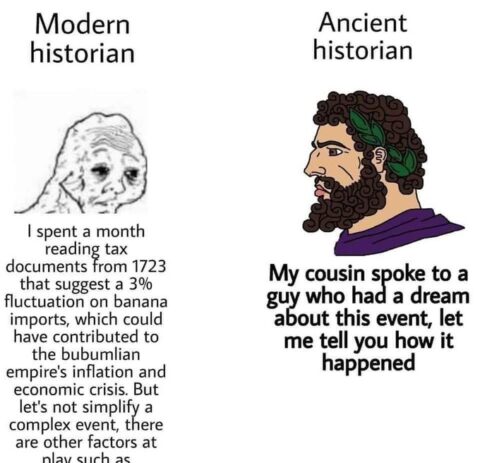In the most recent edition of the Age of Invention newsletter, Anton Howes follows up on his earlier post about the history field’s efforts to track down and debunk fake history:
The concern I expressed in the piece is that the field of history doesn’t self-correct quickly enough. Historical myths and false facts can persist for decades, and even when busted they have a habit of surviving. The response from some historians was that they thought I was exaggerating the problem, at least when it came to scholarly history. I wrote that I had not heard of papers being retracted in history, but was informed of a few such cases, including even a peer-reviewed book being dropped by its publisher.
In 2001/2, University of North Carolina Press decided to stop publishing the 1999 book Designs against Charleston: The Trial Record of the Denmark Vesey Slave Conspiracy of 1822 when a paper was published showing hundreds of cases where its editor had either omitted or introduced words to the transcript of the trial. The critic also came to very different conclusions about the conspiracy. In this case, the editor did admit to “unrelenting carelessness“, but maintained that his interpretation of the evidence was still correct. Many other historians agreed, thinking the critique had gone too far and thrown “the baby out with the bath water“.
In another case, the 2000 book Arming America: The Origins of a National Gun Culture — not peer-reviewed, but which won an academic prize — had its prize revoked when found to contain major errors and potential fabrications. This is perhaps the most extreme case I’ve seen, in that the author ultimately resigned from his professorship at Emory University (that same author believes that if it had happened today, now that we’re more used to the dynamics of the internet, things would have gone differently).
It’s somewhat comforting to learn that retraction in history does occasionally happen. And although I complained that scholars today are rarely as delightfully acerbic as they had been in the 1960s and 70s in openly criticising one another, they can still be very forthright. Take James D. Perry in 2020 in the Journal of Strategy and Politics reviewing Nigel Hamilton’s acclaimed trilogy FDR at War. All three of Perry’s reviews are critical, but that of the second book especially forthright, including a test of the book’s reproducibility:
This work contains numerous examples of poor scholarship. Hamilton repeatedly misrepresents his sources. He fails to quote sources fully, leaving out words that entirely change the meaning of the quoted sentence. He quotes selectively, including sentences from his sources that support his case but ignoring other important sentences that contradict his case. He brackets his own conjectures between quotes from his sources, leaving the false impression that the source supports his conjectures. He invents conversations and emotional reactions for the historical figures in the book. Finally, he fails to provide any source at all for some of his major arguments
Blimey.
But I think there’s still a problem here of scale. It’s hard to tell if these cases are signs that history on the whole is successfully self-correcting quickly, or are stand-out exceptions. I was positively inundated with other messages — many from amateur historical investigators, but also a fair few academic historians — sharing their own examples of mistakes that had snuck past the careful scholars for decades, or of other zombies that refused to stay dead.




